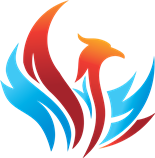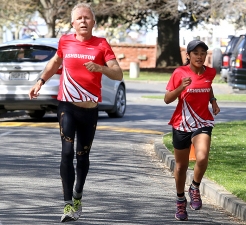Search

 Joe Ford competing at a Run and Walk Ashburton event a couple of months ago alongside one of the club’s younger members Angel Spooner. Photo Robyn HoodMore than 40 years ago, Joe Ford discovered a love and a talent for running. He still loves running, and recently was recognised by NZ Athletics for his work in the field of athletics. But the road Ford has travelled for the past 40 years hasn’t always been smooth. This is his story.
Joe Ford competing at a Run and Walk Ashburton event a couple of months ago alongside one of the club’s younger members Angel Spooner. Photo Robyn HoodMore than 40 years ago, Joe Ford discovered a love and a talent for running. He still loves running, and recently was recognised by NZ Athletics for his work in the field of athletics. But the road Ford has travelled for the past 40 years hasn’t always been smooth. This is his story.
If you’ve ever driven down Walnut Avenue after work, past the Ashburton Domain, chances are high you would have passed Joe Ford out for a run.
Over the years he estimated he has run more than 8000 laps around the domain.
His love for running began 40 years ago, and it was a love that continued today, and one that was recently recognised by New Zealand Athletics, with the presentation of a long service award and pin to recognise his years of commitment and dedication to the sport.
That involvement in athletics began back in 1975, back in the days when large numbers of the then Ashburton Harriers Club would run around the domain every night.
Ford was still at school in 1975, and came third in the 800m heats for Red House on sports day, finishing in 2.38 minutes.
He decided to jog a lap around the domain every night until the athletics finals two weeks later, and came dead last in 2.21 minutes. But it was a big enough improvement that Ford felt he could make something of his talent.
A year of jogging later, Ashburton College hosted a weekend training school for up and coming athletes with coaches from all over New Zealand.
Ford was in the middle distance running group and the weekend coach was former Commonwealth Games coach Bruce Milne.
“He was a very imposing chap with a booming loud voice.
“We waited in a classroom for him to appear.
“The door opened and he just stared at us and in a very loud voice said ‘hands up all those who have run for two hours or more’.”
No hand went up.
Just one trembling hand went up when he asked if anyone had run for an hour or more.
By the time the coaching clinic finished on the Sunday afternoon, all of the boys and girls in the class had run for over an hour.
By the age of 16 they were all doing two hours easily.
That weekend class decided his life as a runner, Ford said.
“The weekend was spent learning all the programmes of the world’s great athletes as well as our own Dick Tayler (1974 Commonwealth games gold medallist), how the programmes were designed to get the best results and how to peak at the right time for serious races.”
In the 1970s and 1980s running was popular in New Zealand.
The country was full of talented runners and coaches.
Ford said among a runner’s idols in those days were John Walker, Rod Dixon and Dick Quax.
Walker and Quax were both world record holders in their day.
Over the summer months for the next 15 years Ford and other Ashburton athletes raced most Saturdays at QEII stadium in Christchurch.
“In those days the public paid to watch races and around 3000-5000 people would turn up every Saturday afternoon to watch some of the best athletes in New Zealand compete,” Ford said.
Ford said he was always only an average runner.
In 15 years of competing at QEII during the summer he was never allowed to run in the A grade races.
His times of 1.56 minutes for 800m, 3.56 minutes for 1500m and 8.41 minutes for 3000m would have made him last in the A grade races, although today those times would win most A grade races in Christchurch.
“You had to run under 1.50 minutes for 800m to have any hope of winning in Christchurch and under 3.40 minutes for 1500m to have any chance of winning this event.
“Runners knew back then that if you got selected for the Canterbury team to run in Auckland you would come up against the likes of John Walker and Rod Dixon.”
After marrying at age 27, Ford’s running career suffered a major setback when he was struck down with ME (Myalgic Encephalitis), also known as chronic fatigue syndrome.
At the time Ford had increased his mileage to 160km a week and was also renovating his first home.
“There were warning signs for several months that I was overdoing it.
“Then suddenly at work the room started spinning around.
“I went home and could barely stand for the next four weeks. I was off running for 11 years.”
He tried many times to get back into it, but his body wasn’t ready.
A family holiday at Okains Bay was the turning point though.
Ford’s then 10-year-old son Ben wanted to go for a run, so Ford put on his shoes and ran 2km with his son.
It felt like a marathon and he lay down for the rest of the day, but the pair continued to run each day, and on the last day of the holiday the pair ran 7km.
“It was one of the most exciting and scariest times of my life,” Ford said.
He was excited that the horrible illness that had tortured him for 11 years may have gone, but at the same time knew he needed to be sensible.
He started back with jogs that were little more than a fast-paced walk, going out at night and in the dark on country roads, not wanting anyone to see him in case it all came crashing down.
“After three months I was running 117kms a week and that included a 20km hill run once a week.
“I was back, at 38 years old, and looking ahead to compete in veteran athletics.
“At 40 years old I briefly ran the fastest time in the world that year for 800m at 2.003 minutes.”
That was quickly overtaken by European runners in their summer season, but Ford was back on top of his game. He was doing the 1500m in 4.02 minutes and 9.16 minutes for 3km.
“It felt amazing. Every single step I ran I felt glad to be alive,” Ford said.
He was still running under 34 minutes for 10km at age 49.
“I still ran the same programmes I did in my teens and early 20s but took it carefully and watched for any warning signs,” he said.
When Ford was 50, the Canterbury earthquakes struck.
His job in insurance became busier and he only got a 15-minute jog each night in for the next year.
“I then realised that I was never going to get back what I had in my early 40s and it was time to turn to coaching the next generation of runners.”
Sadly, there were fewer around these days, Ford said.
People ran more to achieve a one-off goal like a half marathon.
Today he had a small group of runners who ran all year round and said it was great to see them running faster than they ever dreamed was possible.
“It doesn’t matter how old you are, if you want to get fit and run and follow some sound advice, you will improve.”
Ford said it was great to be able to, as a coach, put something back into a sport that had given him so much joy and happiness.
“It was hard work and a lot of sweat, but worth it.”
By Erin Tasker © The Ashburton Guardian - November 2018


